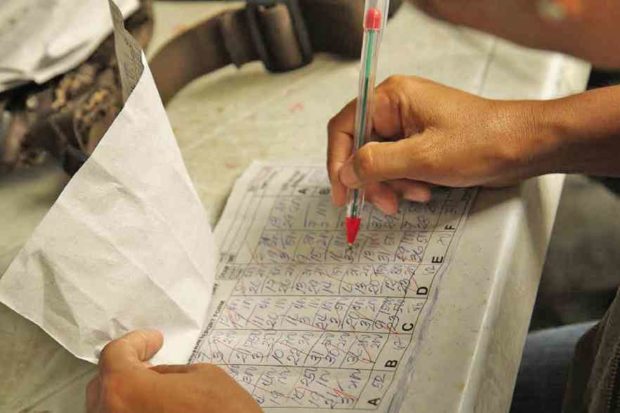
A bet collector for the government-sanctioned Small Town Lottery in Lucena City checks a list recording number combinations for the day. —DELFIN T. MALLARI JR.
Despite protests from residents and local officials, the gaming company Randomchoice on Wednesday proceeded with the operation of the government-sanctioned Small Town Lottery (STL) throughout Aurora province.
Aurora Gov. Gerardo Noveras confirmed that Randomchoice had started taking bets.
“For a long, long time, Aurora was free from ‘jueteng’ (illegal numbers game) and other forms of gambling. It’s not anymore gambling-free because of STL,” Fr. Israel Gabriel, social action director of the Prelature of Infanta, told the Inquirer by telephone.
Gabriel led around 500 residents who picketed the provincial capitol in Baler town on Tuesday. They held anti-STL motorcades in the province’s eight towns before a 2 p.m. dialog at the capitol with representatives of the Philippine Charity Sweepstakes Office (PCSO), the Department of the Interior and Local Government and Randomchoice.
In that dialog, Gabriel said the prelature demanded a stop to STL operations.
Hard-earned money
“[STL] is plain and simple jueteng. It is going to siphon off hard-earned money from people who make a living from farming and fishing. It is going to create a culture of gambling,” he said.
STL was started during the term of the late President Corazon Aquino in a bid to stamp out the popular illegal numbers game jueteng. Former President Gloria Macapagal-Arroyo revived STL in 2006 and allowed test runs in 18 cities and provinces.
Former Interior Secretary Ismael Sueno had said that the Duterte administration had granted franchises to gambling lords to make them shift to STL instead.
STL generated P400 million monthly in 2016 and expected to draw P2.2 billion monthly in 2017, according to Sueno.
Local officials criticized Randomchoice for bypassing local governments and for not holding public consultations on the STL operation.
Noveras said the provincial government had not issued a business permit to Randomchoice.
“We were just informed by PCSO that a franchise was given [to Randomchoice],” he said.
Asked if he ordered a stop to it, Noveras said: “I don’t know of a legal basis to stop it.”
Management matter
A PCSO representative told protesters and local officials that she was not authorized to stop Randomchoice but promised to bring the matter to the PCSO management.
A check with the PCSO website on Wednesday showed that Randomchoice was not on the list of 56 STL authorized agent corporations.
The revised STL implementing rules and regulations did not require agents to get business permits from local governments. Section 40 pertains only to an agreement as to how the 3-percent allocation from charity funds should be used.
Congressional districts get a 0.25 percent share from the 3 percent allocation; provincial governments, 0.75 percent; and the Philippine National Police, 2.50 percent.